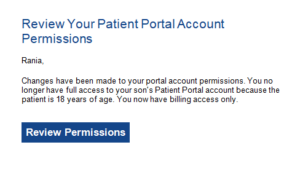Estate Planning For College Students

Eighteen years ago, as I strolled through Babies”R”Us with my newborn baby propped on my shoulder, a middle-aged woman walked up to me and said: “Enjoy every minute. It doesn’t last long.”
She was right! In what seems like a blink of an eye, my oldest son turned eighteen this week!
It’s bittersweet. Seeing the amazing young man he has become fills me with joy and pride. But although I’m excited about all the opportunities that lie ahead for him, I’m a bit anxious too. As a parent it’s been my job to keep him safe for 18 years, but soon, my baby will be heading off to college on his own.
For the next few years, my son will still be reliant on my husband and me for the majority of his financial support; however, because he is now a legal adult, certain privacy laws can keep us from helping him when he needs us most.
The image above is from a note I got on my son’s birthday from one of my son’s medical providers. It informed me that because he was now eighteen years old, I would not longer have access to his medical records. Why? Because he is an adult in the eyes of the law and privacy laws prevent medical providers from disclosing private information without the patient’s permission.
Similar restrictions apply to financial and legal matters.
So this week, my son will also be signing the following documents so that we will have the legal authority to step in and help him if it ever becomes necessary:
- Durable Power of Attorney: The Durable Power of Attorney will allow my son to authorize my husband and me to manage his financial affairs either immediately or in the future should he become mentally or physically unable to do so. This would authorize us to handle tasks such as paying bills, applying for social security or government benefits and opening and closing accounts if necessary.
- Medical Power of Attorney: The Medical Power of Attorney allows him to authorize us to make medical decisions if he is incapacitated and unable to do so. An agent acting under a Medical Power of Attorney is authorized to see the principal’s medical records to make informed medical decisions on his or her behalf.
- HIPAA Release: HIPAA (the Health Insurance Portability and Accountability Act of 1996) requires health care providers and insurance companies to protect the privacy of patient’s health care information. Those who violate HIPAA are subject to civil and criminal penalties, including jail time, which makes them reluctant to share protected health information without an authorization.While it’s true an agent under a Medical Power of Attorney has the authority to view the principal’s medical records, the Medical Power of Attorney does not grant authority to the agent until the principal is incapacitated. If capacity is questioned, then HIPAA regulations would prevent access to protected health information.This means that even parents may be prevented from accessing their children’s medical information without an authorization.
These three documents are easy to prepare and are relatively inexpensive. If your child is turning eighteen this year, it’s important that you discuss the importance of these documents with him or her.


Comments